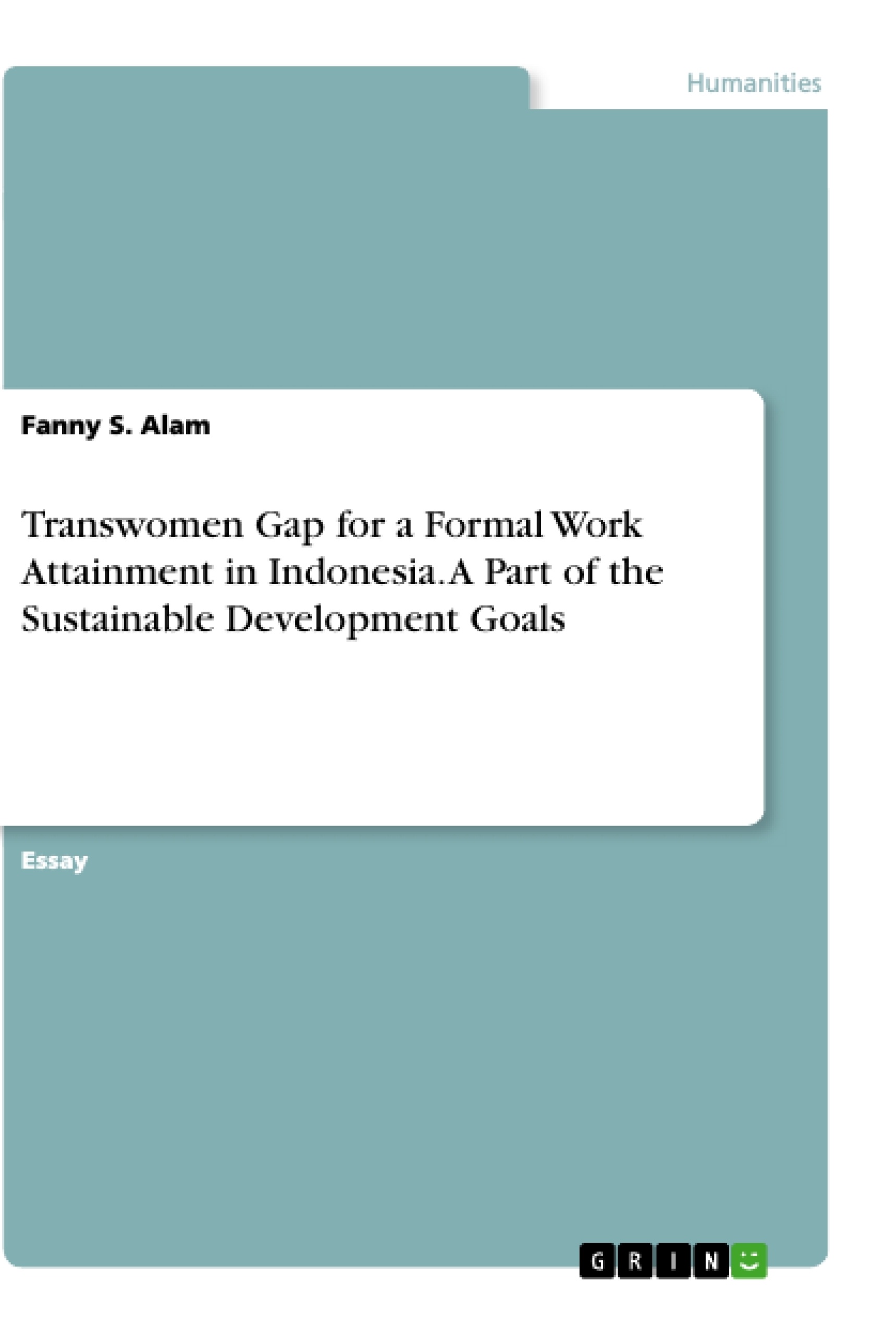A formal work attainment for transwomen tends to create another negative concern due to the employers' highlight to their sexuality not to their capacity. The paper elaborates how this gap occurs based on the methods of direct observation toward keypersons as well as literature and media study. It comes with an expectation that in long terms, the group might be employed for formal works as maintained for informal ones currently. The Indonesian Government's commitment to signing Sustainable Development Goals (SDGs) from 2015-2030 views their significant development platform in a purpose to create sustainable developing aspects for more prosperous societies and the country. It is translated into Presidential Act no. 59/2017 about The Implementation of Achievement towards Sustainable Development Goals with an emphasis of three principles, such as Acceleration, Funding, and Inclusion.
Inclusion in SDGs means leaving no one behind, ensuring that all the targets must meet the interests of all people of nations without any exceptions as stated by UNSTATS, and it covers vulnerable or marginalized groups, including LGBTI. 12 UN entities endorse the statement underlining the importance of LGBTI's participation for countries' development process. In contradict, the LGBTI in Indonesia have faced serious challenges, principally about their human rights. Transwomen are considered repressed for their right to be properly employed.
With the ratifications of some covenants regarding human and civil rights to the state laws in Indonesia, the country is supposed to initiate the process of eliminating any discrimination towards minorities, including transwomen, however, it is not a smooth running since most of society layers in Indonesia still are considering their existence immoral, therefore they think of numerous ways to "normalize" them based on their origin of sex when being born instead of respecting their confirmed rights. As a consequence, insurmountable discrimination practices heading to legal criminalization continuously emerge along with the absence of the government attention, including the right fulfilment of transwomen in terms of formal work attainment despite the state's approval to sign SDGs.
Inhaltsverzeichnis (Table of Contents)
- INTRODUCTION
- RESEARCH METHODOLOGY
- DISCUSSION
- The State's Ratification of UN Covenants about Human and Civil Rights to Affirm the Citizens' Rights with No Exceptions
- SDGs' Credentials for the Principle "No one Left Behind" as An Inclusiveness for Transwomen's Right for Work Attainment
- Transwomen Gap in Indonesia For A Formal Work Attainment as Another Issue for SDGs' Achievement
- CONCLUSION AND RECOMMENDATION
- REFERENCES
Zielsetzung und Themenschwerpunkte (Objectives and Key Themes)
This paper examines the challenges faced by transwomen in Indonesia in achieving formal work attainment, particularly within the framework of the Sustainable Development Goals (SDGs) and the principle of inclusivity. It explores the gap between the state's commitment to human rights and the reality of discrimination faced by transwomen in the workplace.
- The implementation of the SDGs and the principle of "no one left behind" in the context of transwomen's rights in Indonesia.
- The impact of heteronormative values and traditional societal beliefs on transwomen's access to formal employment.
- The state's ratification of UN covenants on human and civil rights and its implications for the protection of transwomen's rights.
- The challenges and obstacles transwomen face in entering the formal work sector, including discrimination and prejudice.
- The potential for transwomen to be employed in formal work, despite the current obstacles.
Zusammenfassung der Kapitel (Chapter Summaries)
- INTRODUCTION: This chapter provides an overview of the Indonesian context regarding human rights and the country's commitment to achieving the Sustainable Development Goals. It highlights the challenges transwomen face in Indonesia, including discrimination and limitations on their ability to achieve formal work attainment.
- RESEARCH METHODOLOGY: This chapter details the qualitative methodology used in the research, which involves interviewing key persons and conducting a literature review of media articles and academic resources related to the topic.
- DISCUSSION: This section delves into the state's ratification of UN covenants on human and civil rights, its implication for transwomen's rights, and the relevance of the SDGs' principle of "no one left behind" in addressing their challenges. It also examines the gap between the state's commitment to inclusivity and the reality of discrimination transwomen face in accessing formal work.
Schlüsselwörter (Keywords)
The main keywords and focus topics of this paper include the Sustainable Development Goals (SDGs), inclusivity, transwomen, work, and LGBTI.
What are the main barriers for transwomen seeking formal work in Indonesia?
Transwomen face significant discrimination due to societal focus on their sexuality rather than their professional capacity, often rooted in traditional heteronormative values.
How do the Sustainable Development Goals (SDGs) relate to trans rights?
The SDGs follow the principle of "leaving no one behind," which implies inclusive development for marginalized groups, including the LGBTI community.
What is the Indonesian government's legal stance on this issue?
While Indonesia has ratified UN covenants on human rights and signed the SDGs, there is a gap between these commitments and the actual legal protection of transwomen's rights.
What does "Inclusion" mean in the context of Indonesian labor?
Inclusion refers to ensuring that all citizens, regardless of gender identity, have equal access to employment opportunities and legal protections in the workplace.
Why are transwomen often limited to informal work sectors?
Due to systemic prejudice in formal hiring processes and the lack of government intervention, many transwomen are forced to rely on informal jobs for survival.



